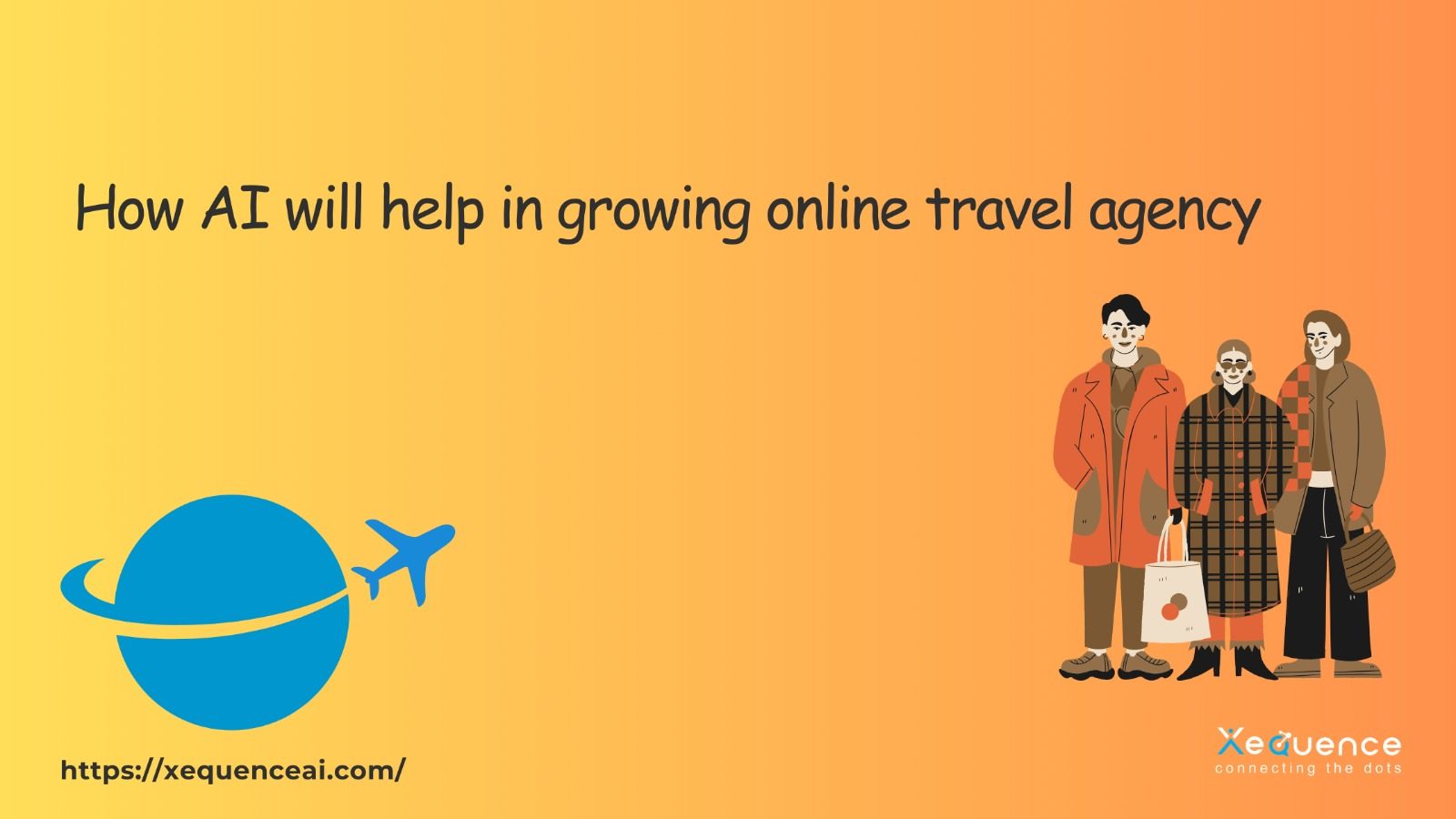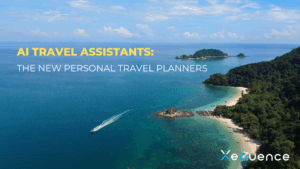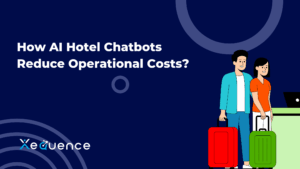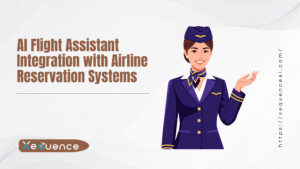- Home
- Artificial Intelligence
- How AI will help in growing online travel agency
How AI will help in growing online travel agency
- September 23, 2024
- Rajib Kar
- Artificial Intelligence, Chatbot, Gen AI

How AI is Revolutionizing the Growth of Online Travel Agencies
Technology has played a major role in the remarkable upheaval that has occurred in the tourism business in recent years. The incorporation of artificial intelligence is one of the most important technological developments in this industry. Customers’ entire travel experience has changed as a result of AI, which has also increased productivity and efficiency. We will discuss how artificial intelligence is transforming the tourism industry and propelling unprecedented growth.
How AI can Improve Operational Efficiency
- Predictive Analytics
- Automated Tasks
- Optimizing Pricing Strategies
- Dynamic pricing
- Fraud detection
- Customer sentiment analysis
- Personalized recommendations
How Artificial Intelligence Helps in Travel Business Growth?
Chatbots and Virtual Assistants
Customer service has been transformed in the travel sector by the incorporation of AI-powered chatbots and virtual assistants into the creation of travel websites. The customer experience of any online travel agency can be improved by chatbots since they can handle a variety of consumer inquiries, offer prompt support, and deliver rapid answers. Along with organizing hotels, flights, and itineraries, they can also offer recommendations for local places to visit. The travel industry has benefited greatly from chatbots because of their ability to comprehend and reply to client inquiries with increasing sophistication due to improvements in machine learning and natural language processing.
In-Person Customer Service
Enhancing in-person customer interactions with AI is a rapidly expanding trend, despite the fact that employing AI to improve online customer care has become standard. Thus, by reducing wait times at information or welcome desks, this idea ultimately increases overall operational efficiency. Speaking directly to customers and giving them travel advice, Connie, Hilton’s AI-powered chatbot, is made possible by artificial intelligence and speech recognition technology. The robot’s performance is enhanced by each human-robot exchange, raising the bar for all subsequent exchanges.
Data Analytics for the Travel Industry
Decision-making can be rapid and intelligent because AI’s revolutionary approach to data processing and analysis. Big data sets are handled by AI algorithms with ease, and they extract insightful information about consumer preferences, industry trends, and operational patterns.
Pricing tactics are optimized, operational procedures are streamlined, and personalized recommendations are improved by this data-driven approach. By using AI, travel agencies may become more operationally efficient and provide their clients with a more personalized and responsive experience by adapting dynamically.
Personalized Recommendations
With its ability to customize experiences based on human preferences, AI is revolutionizing the travel sector. AI algorithms provide personalized recommendations for locations, lodging, and activities based on analysis of past data and user behavior. Travelers now have a more tailored and fulfilling trip, with online travel agency India making travel planning more effective and individualized. Such platforms enable users to receive personalized recommendations that correspond with their own likes and tastes by analyzing user ratings and preferences.
Dynamic Pricing
The travel industry uses dynamic pricing, adjusting rates based on supply and demand. AI enhances this by analyzing demand, historical data, and trends, helping companies optimize prices, boost profits, and stay competitive. AI-driven pricing offers businesses greater flexibility and efficiency.
Overcoming Travel Disruption
AI quickly analyzes complicated data during unexpected situations, which is crucial for managing travel disruption. AI systems forecast improves operational resilience, from weather-related problems to airline delays, much better than human. In order to make proactive decisions on resource allocation, rerouting, and timely traveler communication, machine learning algorithms process data in real-time. In spite of unforeseen difficulties, this proactive strategy lessens the effects of disruptions, guaranteeing a more seamless travel experience and higher customer satisfaction.
Smart Luggage Handling
The travel industry uses smart luggage handling, which makes use of cutting-edge technologies like GPS monitoring and RFID tags, to improve the security and efficiency of baggage management. These developments lessen the possibility of luggage loss or misplacing by enabling travelers to follow their bags in real-time using smartphone apps.
AI Face Recognition
By using artificial intelligence algorithms to recognize and authenticate people based just on their faces, AI face recognition is a state-of-the-art technology. For precise face matching against a database, it examines distinctive facial characteristics like the separation between the eyes or the nose’s shape. Artificial intelligence facial recognition is revolutionizing a variety of industries, including surveillance and device user authentication. It is widely used for security, access control, and authentication purposes and provides a clever and effective way to verify identity.
Workforce Optimization Solution
Workforce organization is made more efficient and flexible in the travel sector by AI-powered personnel management schedulers. By optimizing worker schedules in response to variations in demand, these intelligent solutions reduce over manning or shortages by utilizing predictive analytics. Operational productivity is increased by AI, which guarantees the best possible resource allocation. The travel industry is dynamic and always evolving, and this technology helps to improve employee happiness and overall service quality in addition to streamlining scheduling procedures.
Fraud Detection and Security
Because AI enhances fraud detection systems, it is essential to improving the security environment in travel agency. Sophisticated algorithms analyze the patterns of transactions and quickly spot irregularities and possible security risks. Users are reassured by this proactive strategy, which guarantees safe online transactions. AI has a strong defense against cyber attacks since it is always learning and adapting to new fraud strategies. By securing sensitive data and promoting consumer trust, the travel industry’s comprehensive security framework is reinforced by the use of AI in fraud detection.
Language Translation
When it comes to facilitating a smooth international travel experience, AI-driven language translation is revolutionizing the travel business. When it comes to enabling seamless communication between multilingual service providers and travelers, advanced language processing technologies allow for real-time translation of both text and speech. As a result, there will be more accurate and productive interactions throughout travel, which will enhance the travel experience and ultimately lead to higher customer satisfaction and a more connected travel industry worldwide.
VR and AR
By providing consumers with immersive experiences, virtual reality and augmented reality are revolutionizing the travel sector. While augmented reality improves real-world experiences by superimposing digital information, virtual reality allows virtual tours of locations. Through the use of these technologies, travelers may plan their trip more thoroughly and make more informed decisions by exploring lodging and attractions in previously unheard-of ways.
Conclusion
Through better customer service, easier business operations, better marketing, and increased security, artificial intelligence is transforming the travel sector. The impact of AI on travel agencies will only increase as technology advances. In a competitive market, travel-related businesses who embrace AI will have a competitive advantage. Travel agencies may enhance customer satisfaction, expand their clientele, and increase revenue by utilizing and learning about AI. Long-term success and competitiveness in the travel sector can be achieved by businesses if it adopt AI.
Recent Posts
Newsletter
Get regular updates on data science, artificial intelligence, machine
You may also like

AI Travel Assistants: The New Personal Travel Planners

5 Things an AI Travel Assistant Can Do in Seconds

How AI Hotel Chatbots Reduce Operational Costs?




